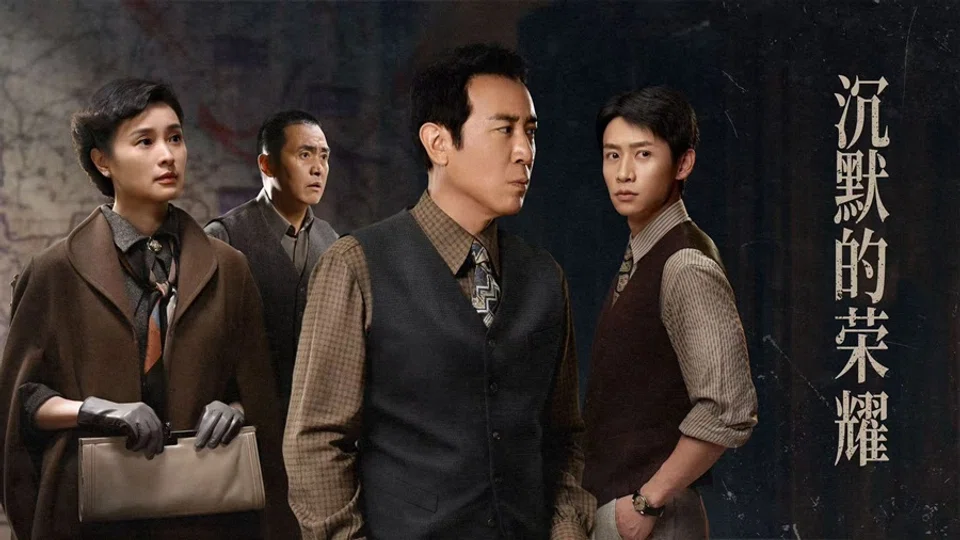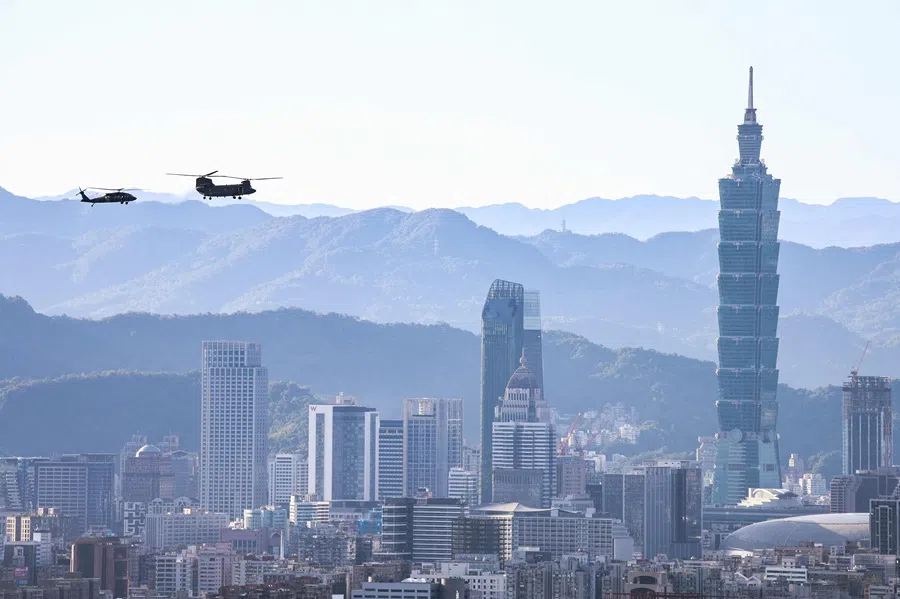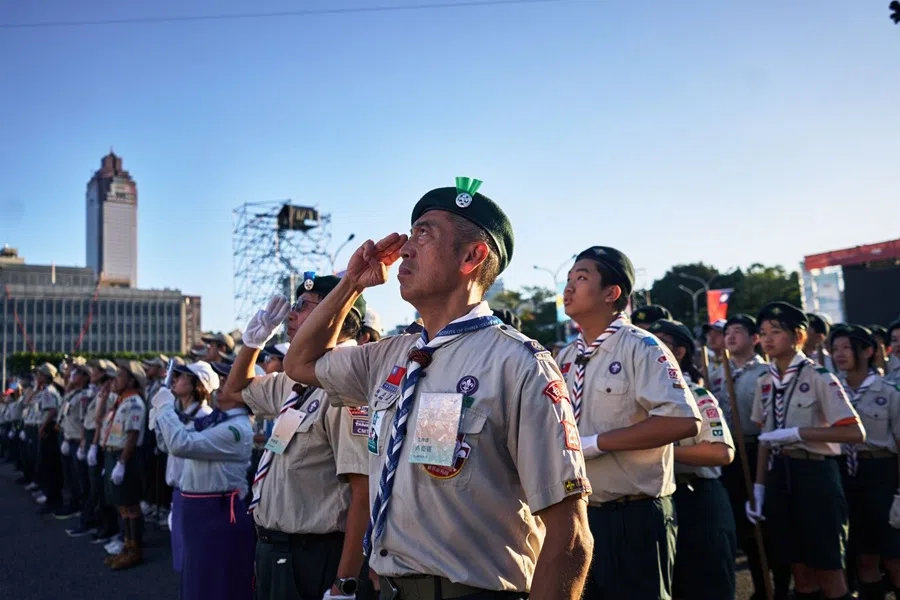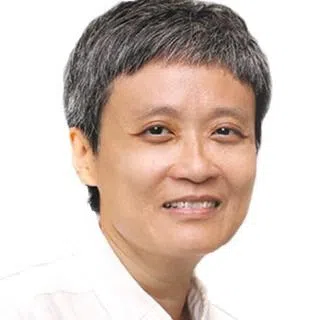Beijing’s spy drama set in Taiwan isn’t winning hearts across the strait
China’s latest television drama Silent Honour (《沉默的荣耀》), based on real events and people, premiered with a bang. Its premise of an undercover communist agent in Taiwan around the time of the founding of the Republic of China has sparked unification discussions. Lianhe Zaobao correspondent Sim Tze Wei takes a look at the drama’s reception on both sides of the Taiwan Strait.

The first espionage drama laden with official overtures from mainland China, Silent Honour (《沉默的荣耀》), premiered just before National Day and Martyrs’ Day (30 September) in mainland China. Set in Taiwan, it tells the story of Lieutenant General Wu Shi, deputy chief of general staff in Taiwan’s Ministry of National Defence, who was also an undercover communist.
High viewership
According to reports from China News Service, Sing Tao News Network and Fujian Daily, Silent Honour is the first of its kind to be based on real people and events from history. It is a key project supported by mainland China’s National Radio and Television Administration, and the production has also received special support from Fujian province. The drama was initiated and produced in Xiamen, with its script guided by the Ministry of State Security and the Taiwan Affairs Office of Mainland China.
Taiwanese academics interviewed felt that instead of serving as a tool for unification, the drama could stir concerns from the Taiwanese public about whether there are communist spies among them.
Interviewed scholars assessed that the production and release of this drama was mainly to cater to mainland audiences’ taste for espionage films. The story’s location, set in Taiwan, helps to strengthen the sense of unity that “Taiwan is a part of China”. While it could spur sentiments of unification in mainland China, it might not have the same effect in Taiwan. Taiwanese academics interviewed felt that instead of serving as a tool for unification, the drama could stir concerns from the Taiwanese public about whether there are communist spies among them.
According to official announcements, Silent Honour is the first major television drama that is focused on the covert struggles on the Taiwan frontlines around the time of the founding of the People’s Republic of China.
On 30 September, the series premiered on prime time on CCTV-8, as well as on iQiyi and Migu Video, achieving a commendable real-time television viewership rating of over 3% in its debut.
Based on historical events
Played by actor Yu Hewei, the protagonist, Wu Shi, is the highest-ranking undercover intelligence officer of the Chinese Communist Party (CCP) dispatched in Taiwan, codenamed “secret agent no. 1” and serving as the deputy chief of staff of Taiwan’s Ministry of National Defence. The plot revolves around Wu’s mission to Taiwan in 1949, and his attempts to transmit critical military intelligence to the East China Bureau of the CCP.

On the surface, Wu appeared to be the deputy director of the Fuzhou Pacification Office, but he was secretly working for the CCP. He collaborated closely with Zhu Feng, a female intelligence officer from the East China Bureau, Ministry of National Defence’s Lieutenant General Chen Baochang and aide Nie Xi, among others, successfully transmitting classified military intelligence to mainland China over the course of a few months.
According to Sing Tao News Network, around 1949, over 1,500 cadres secretly entered Taiwan as part of the CCP’s plan to liberate Taiwan, and in the early 1950s, over 1,100 individuals, including Wu, were publicly tried and executed by the Kuomintang.
According to the Taiwan Human Rights Memory Bank website, the Wu Shi case was uncovered because Cai Xiaoqian, who was in charge of the Taiwan Provincial Working Committee, was captured and had confessed.
On 10 June 1950, Taiwan executed Wu, Zhu, Chen and Nie for “engaging in espionage activities for the CCP”. According to Sing Tao News Network, around 1949, over 1,500 cadres secretly entered Taiwan as part of the CCP’s plan to liberate Taiwan, and in the early 1950s, over 1,100 individuals, including Wu, were publicly tried and executed by the Kuomintang.
Real-life warning?
Silent Honour officially began filming on 18 January 2024 on Gulangyu Island, Xiamen. Reports suggested that many scenes in the series precisely replicated the streets of Keelung Port and Taipei in 1949, with slogans on telephone poles handwritten by calligraphers in Chinese script styles common during the Republican era. The uniform insignia and rank patches worn by Wu Shi in the series also strictly adhered to the Kuomintang military structure of 1949.
A China Watch (中国观察) article carried on Sing Tao News Network pointed out that Beijing previously downplayed its covert operations in Taiwan, but has become more high-profile in recent years. In December 2013, the Unsung Heroes Memorial Square was erected in Beijing’s Western Hills, featuring statues of Wu, Zhu, Chen and Nie.
The article stated that presenting the Wu Shi case in a television drama format for the first time had a more profound impact. Against the backdrop of tense cross-strait relations, “the drama openly commemorates martyrs who sacrificed their lives for national unity, with a strong ‘unification’ undertone. Even as the Democratic Progressive Party sounds off about communist infiltration, mainland China is unabashedly praising the fearless communist agents.”
Qi noted that setting the plot in Taiwan and emphasising that “we have comrades who sacrificed and contributed in Taiwan” could further strengthen the sense of unity that “Taiwan is a part of China”.

Qi Dongtao, a senior research fellow at the East Asian Institute of the National University of Singapore, told Lianhe Zaobao that espionage dramas have a market in mainland China. Coupled with the increased focus on the Taiwan issue, it was timely for Beijing to release this drama as it aligns with the mainland’s emphasis on national interest and cross-strait unity.
Qi noted that setting the plot in Taiwan and emphasising that “we have comrades who sacrificed and contributed in Taiwan” could further strengthen the sense of unity that “Taiwan is a part of China”. This could indeed promote unification in mainland China. However, this effect is unlikely to be replicated in Taiwan, as espionage dramas are generally unpopular there.
Wang Kun-yi, chairman of the Taiwan International Strategic Study Society, concurred with this view, saying that Taiwanese people generally prefer watching inane romantic dramas from mainland China instead of politically charged dramas.
Wang also stated that making Taiwanese people watch espionage dramas not only does nothing to spur unification, it would instead remind them: “Is the fifth column right beside you?”
This article was first published in Lianhe Zaobao as “中国大陆首次播放潜伏台湾谍战剧”.





